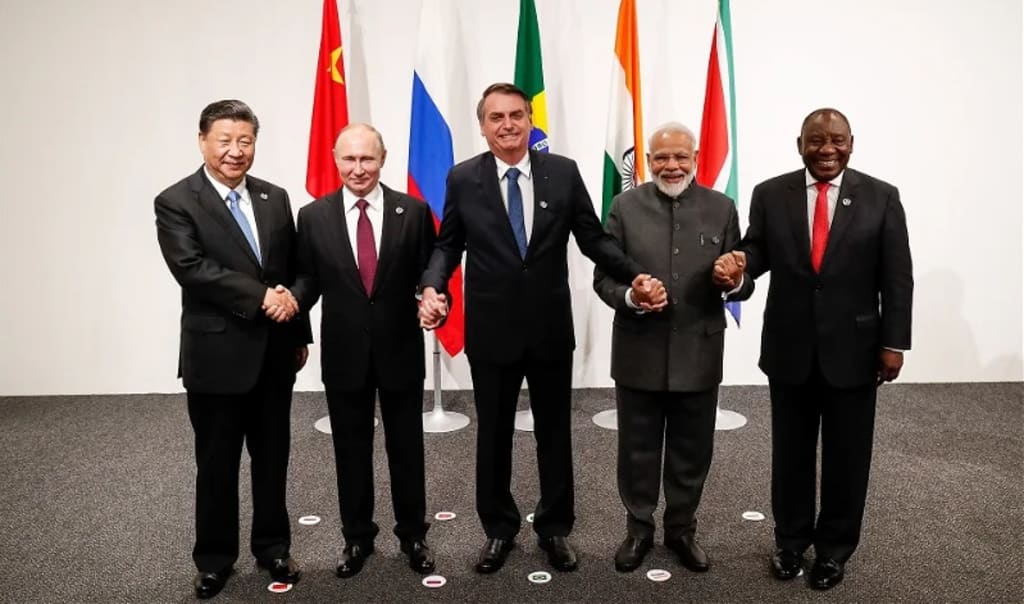BRICS Expands
Six New Members Welcomed into Bloc of Emerging Countries

In a historic development that underscores the global influence of emerging economies, the BRICS alliance has taken a significant stride forward by welcoming six new members into its fold. Argentina, Egypt, Ethiopia, Saudi Arabia, the United Arab Emirates, and Iran have been formally accepted as part of the BRICS bloc, expanding the group's reach and potential. With membership set to become effective from January 1, 2024, the geopolitical landscape is poised for a transformative shift that will have far-reaching implications.
Originally founded as BRIC in 2001, comprising Brazil, Russia, India, and China, the alliance aimed to bring together major emerging economies with the goal of fostering mutual cooperation and influencing global economic policies. The inclusion of South Africa in 2010 transformed BRIC into BRICS, representing not only economic clout but also a broader range of regional perspectives.
The decision to include Argentina, Egypt, Ethiopia, Saudi Arabia, the United Arab Emirates, and Iran as new members is a testament to the growing recognition of their economic prowess, strategic importance, and potential contributions to the bloc's collective objectives. The addition of these diverse nations amplifies BRICS' influence on the world stage and underscores the group's commitment to shaping global economic and political narratives.
Implications of the Expansion
1. Economic Powerhouse: With the inclusion of Saudi Arabia, the United Arab Emirates, and Iran, renowned for their vast oil reserves and strategic significance in energy markets, BRICS further solidifies its status as a global economic powerhouse. These countries' contributions to the energy sector could potentially reshape energy dynamics and discussions within the alliance.
2. Regional Representation: The entry of Argentina, Egypt, and Ethiopia not only brings new economic perspectives but also enhances BRICS' regional representation. Egypt's strategic location and historical significance, Argentina's agricultural strength, and Ethiopia's growing economy contribute to a more comprehensive and inclusive alliance.
3. Geopolitical Balance: The expansion serves as a strategic step toward a more balanced global geopolitical landscape. The increased diversity in terms of culture, geography, and economic focus can lead to well-rounded discussions on international policies and a broader range of solutions to global challenges.
4. Influence on Global Governance: As the group grows, so does its potential to impact global governance. The BRICS alliance now represents a more extensive array of interests and visions, which could lead to stronger collaborations on matters such as trade, sustainable development, and climate change.
5. New Avenues for Cooperation: The newly expanded BRICS opens avenues for collaboration in various sectors, including technology, infrastructure development, and innovation. Member countries can pool resources, knowledge, and expertise to foster mutual growth and development.
Impact of BRICS Expansion
The expansion of the BRICS alliance to include Argentina, Egypt, Ethiopia, Saudi Arabia, the United Arab Emirates, and Iran marks a significant turning point in the trajectory of global geopolitics, economics, and cooperation. The introduction of these six diverse and influential nations into the bloc brings with it a multitude of transformative implications that promise to reshape the global landscape in various ways.
1. Economic Resurgence and Diversity: The inclusion of Argentina, Egypt, Ethiopia, Saudi Arabia, the United Arab Emirates, and Iran significantly bolsters the economic might of the BRICS alliance. These countries bring a diverse array of resources, industries, and expertise to the table, enriching the bloc's economic portfolio. From the agricultural prowess of Argentina to the technological advancements of the United Arab Emirates, this diversity not only enhances economic cooperation within the bloc but also positions BRICS as a formidable player in the global economic arena.
2. Energy Dynamics and Security: Saudi Arabia, the United Arab Emirates, and Iran are globally recognized for their strategic importance in the energy sector. Their inclusion into BRICS provides an opportunity for the alliance to collaboratively address energy security, sustainability, and the transition to renewable sources. Joint initiatives in the energy field could have a significant impact on global markets, pricing, and geopolitical dynamics.
3. Regional Stability and Conflict Resolution: The addition of Egypt and Iran, two influential players in the Middle East, could open up avenues for the bloc to engage in diplomatic efforts for regional stability and conflict resolution. BRICS' collective diplomatic weight could potentially mediate tensions and contribute to peaceful solutions in some of the world's most complex geopolitical scenarios.
4. Development and Infrastructure: Ethiopia's growing economy and commitment to development projects align well with the ethos of the BRICS alliance. The inclusion of Ethiopia could catalyze collaborative efforts on infrastructure development, poverty alleviation, and sustainable growth in the region, thereby contributing to enhanced global economic stability.
5. Cultural Exchange and Soft Power: The expansion also brings with it the opportunity for cultural exchange and the projection of soft power on a larger scale. Each new member nation contributes its unique cultural heritage, traditions, and artistic expressions, enriching the alliance and fostering mutual understanding among diverse societies.
6. Geopolitical Balance and Multipolarity: With the addition of these six members, BRICS further advances the idea of a multipolar world order. This expansion challenges the traditional dominance of a few powerful nations and underscores the relevance of emerging economies in shaping global decision-making processes. BRICS' collective voice could carry more weight in international forums, creating a more balanced and inclusive approach to global governance.
7. Global Governance and Multilateralism: The newly expanded BRICS alliance could invigorate efforts toward strengthening multilateralism and global governance. As a group with diverse economic and political interests, BRICS members can collaborate to reform existing institutions and mechanisms, making them more reflective of the current global realities.
8. Innovation and Technological Advancement: The participation of the United Arab Emirates and Iran, known for their technological progress and innovation, could propel BRICS toward the forefront of technological advancement. Collaborative initiatives in fields such as artificial intelligence, space exploration, and renewable energy could have a lasting impact on global innovation trends.
The expansion of the BRICS alliance to include Argentina, Egypt, Ethiopia, Saudi Arabia, the United Arab Emirates, and Iran ushers in a new era of global cooperation, diplomacy, and economic influence, amplifying the potential of BRICS to address global challenges, shape economic policies, and contribute to a more multipolar world order. As the effective date of January 1, 2024, approaches, the world anticipates the transformative impact that this expanded alliance will have on global affairs, underlining the historic significance of accepting Argentina, Egypt, Ethiopia, Saudi Arabia, the United Arab Emirates, and Iran as new members within the BRICS bloc. These additions underscore the importance of emerging economies in shaping the world's future, ensuring their diverse strengths and perspectives elevate the alliance's influence on global affairs. With the expansion set to become effective on January 1, 2024, the world will closely observe the ensuing impact of this pivotal shift in the dynamics of the BRICS alliance.
About the Creator
Cornelius Prince
Cornelius Prince, a visionary wordsmith, accomplished publisher & innovative content creator. With a passion for the written word, Cornelius's writing transcends boundaries, weaving intricate narratives that resonate deeply with readers.






Comments
There are no comments for this story
Be the first to respond and start the conversation.